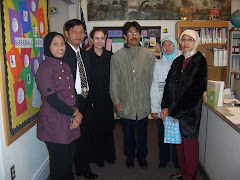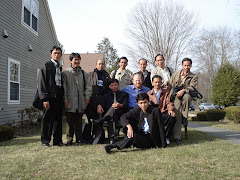Titles
I’m gonna go over some common titles that you might of heard people use when they refer to other people. In addition to titles, I also describe them as suffixes that you attach to names. These suffixes can do two things: 1) they identify the relationship you have with the speaker (intimate or formal) or 2) they identify who the speaker is (male/female, elder/junior).
The first suffix is さん. This is the most common of the honorary suffixes. It’s kind of like the title, “Mr./Mrs./Ms.”. This suffix is really flexible in that you can use it for both genders and it doesn’t matter whether the lady is married or not. The important thing to remember is that it’s a title used to show politeness and respect towards someone. You should use this with people you’ve never met before and people older than you.
The next suffix is くん. The general rule of thumb is that you use くん for young boys, but that’s not always the case. I’ve heard it used for women and for older men as well. It all depends upon the relationship of the speaker and the person whom くん is being referred to. くん is generally an indication that the speaker and the person being referred to are on a first name basis. The important thing to remember is that you can use くん to refer to other people’s children, but you can’t use it to refer to your own.
ちゃん is the female equaivalent, but again, it can be used towards young boys as well. The general rule of thumb is that It’s used for younger girls, but sometimes older and married women can be referred to this suffix as well. For example, an older brother may call his younger sister ちゃん even though she’s married and has children of her own. ちゃん is a form of endearment, so it’s usage indicates that the speaker and the person being referred to are on close terms.
せんせい literally means “teacher”, but it’s usage extends outside of the teaching profession. せんせい is one of those titles that you can use on its own. For example, if you just called people by くん without a name in front of it, it would sound weird, but calling someone by the general title of せんせい is not weird at all. The important thing to remember here is that せんせい is used to show respect towards people who have mastered a special skill or craft. For example, a karate instructor would be called せんせい and so would a doctor.
Lastly, さま is a highly honorific form of さん. You can hear this term attached to the word “customer” in Japanese, which is おきゃくさま. Back in the day when Japan had shogun rulers, the shogun were referred to as うえさま. The only restriction with this title is that you shouldn’t use it to refer to yourself. It’s considered arrogant to use it with your own name attached. Sometimes, さまcan be a derrogative title. It can be used sarcastically to refer to someone who is not that good looking or a know-it-all.
This is not an exhaustive list, so if you can think of other titles, write it in the comment box. Alright, I’m gonna wrap this up. See ya next time.














No comments:
Post a Comment